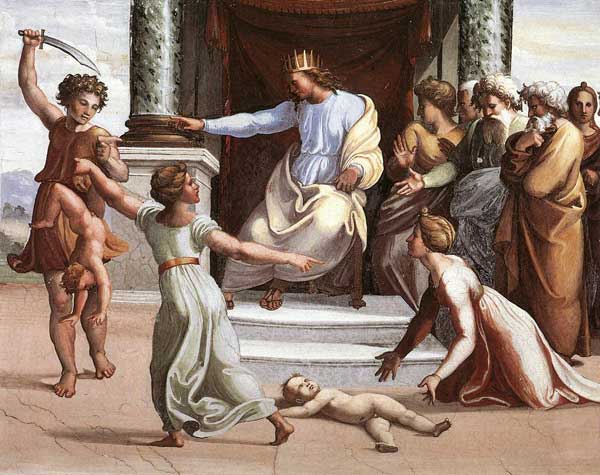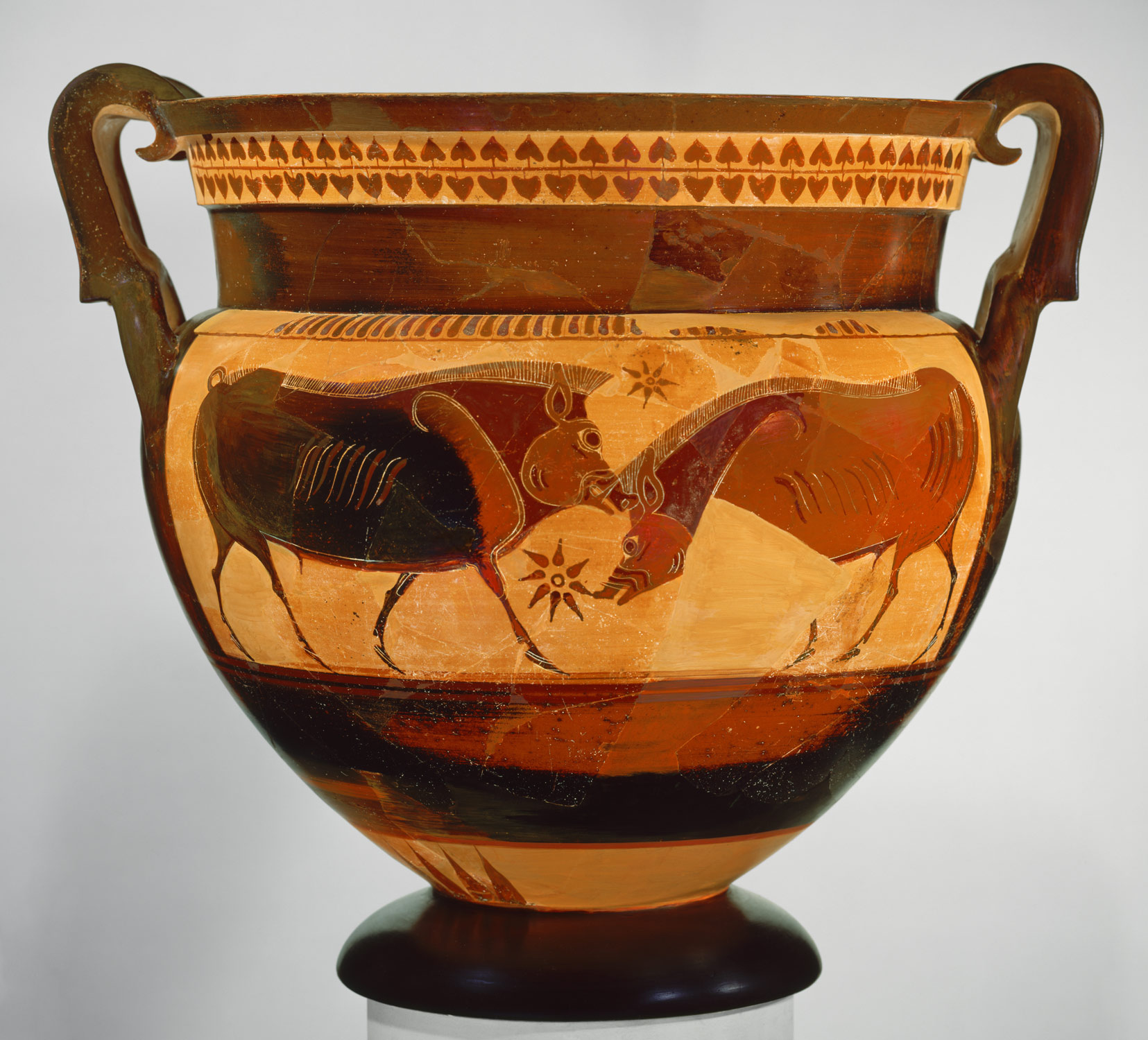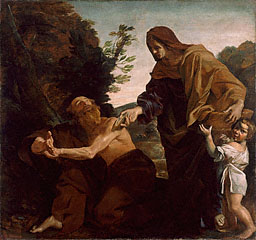In today's texts we meet two "poor providers," Naomi (and her foreign daughter-in-law Ruth) and the unnamed woman who cast the Widow's Mite into the temple treasury.
Ruth 3:1-5; 4:13-17
The widow Naomi declares that she will seek "a resting place" (manoach, NRSV says "some security") for her widowed daughter-in-law, Ruth, so that everything will be OK for Ruth. (She had already blessed both Ruth and Orpah with rest, releasing them to find husbands in their native land; see Ruth 1:9.) Now, until and unless there is a change in Ruth's circumstance, she (and, for that matter, Naomi) is and will continue to be like the dove that Noah released from the window of the ark after the flood, "to-ing and fro-ing," but finding no resting place because all of the landing places are still covered with water. (Genesis 8:9)
(Image source, http://www.josephmillersculpture.com/images/dove-over.jpg)
Ruth, the foreigner from Moab, will be lost in Israel just like the people of Israel were once lost in Egypt--and just like exiles who have been dispossessed for reasons of disobedience: scattered from nation to nation, worshiping with strangers, finding no ease, having no resting place, constantly walking without stopping, moving on to avoid the authorities, life constantly in doubt, with heart murmurs, blurry eyes, depression, and a total lack of confidence. Her desperation will become so great that she'll try to sell herself as a slave, but find no takers. (Deuteronomy 28:62-68; see Lamentations 1:3; return to the Land of Promise and settlement there is rest, Joshua 21:43-22:8.)
(Image source, http://archives.starbulletin.com/2007/02/04/editorial/art1x.jpg)
Ruth will be like the driven-out Lilith, finally finding a place of repose. (Isaiah 34:14)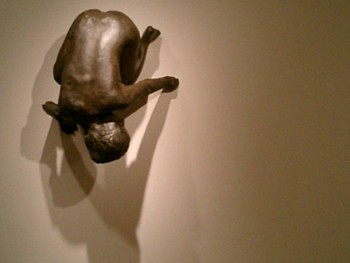
(Image source, http://www.artsjournal.com/artopia/images/kikismith-lilith-1994.jpg)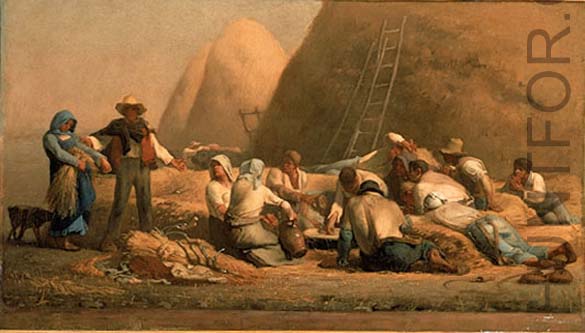
(Image source, http://www.arthistoryarchive.com/arthistory/christian/images/JeanFrancoisMillet-Harvesters-Resting-Ruth-and-Boaz-1850-53.jpg)
Ruth will be like the simple person, inexperienced in the ways of wisdom, who gets into trouble. In desperate straits, in mourning, she will be like the Psalmist who calls out, "the sorrows of death compassed me, and the pains of hell gat hold upon me: I found trouble and sorrow." (KJV, Psalm 116:3) She will be brought low and then saved by God--in this case, Naomi's God--and by Naomi. But when all is said and done, when Naomi has helped her find "some security," Ruth will also be able to pray the thanksgiving portion of the Psalm: "Return, O my soul, to your rest; for the LORD has been good to you." (Psalm 116:6) Naomi and Ruth together are like the ark of God--which travels here and there, and is sometimes captured in a foreign land. It may be viewed as a curse in Philistia, but it scatters blessing wherever it may go in Israel, until it comes finally to rest in Jerusalem during the reign of Ruth's descendant, King David. (1 Chronicles 6:16)
Naomi knows, and shares, the desperate plight of her daughter-in-law Ruth. Given the cultural milieu, Naomi is in fact poorer and more desperate than Ruth. Naomi has an additional disadvantage, her age, which prevents her from childbirth. (Ruth 1:11) But Naomi also has an advantage; she is a native widow. Therefore it takes their cooperation, the sharing of their relative strengths and assets (Ruth's youth and Naomi's pedigree), to move the story toward its redemptive end. Nevertheless, it is Naomi who takes the initiative to provide protection for Ruth (and for herself), an initiative that should rightfully have been taken by the man in the story, the go'el, or near kinsman and redeemer. (Boaz is referred to as "our 'kin,'" moda`at, which is not so precise a connection as to invoke the law of the Levirate Marriage. But note the strong connection to the story of Tamar in Genesis 38; see Ruth 4:12.) Naomi tells Ruth to take advantage of the showers at the shelter in order to make herself presentable, perfuming (How much did that cost? Mark 14:3, John 12:3), and going by night to the threshing floor, concealing herself in a cloak until Boaz has eaten his meal and drunk his wine. (Ruth 3:2-3)
(Image source, http://farm3.static.flickr.com/2348/2280616209_65c78095ee.jpg)
Given the well-known Hebrew euphemisms ("feet" = sexual parts [see Exodus 4:25, Isaiah 6:2] and "lie down" = have sexual relations [too many to cite]), there is clearly a strong sexual innuendo in Ruth 3:4. But the writer never tells us explicitly "what actually happened on the threshing floor." [Gray, Joshua, Judges, and Ruth (New Century Bible), p. 309] That makes for a better story, it holds us in greater suspense.
When the suspense is resolved, Ruth has born a child--for Naomi (Ruth 4:16; compare Hagar and Sarah, Genesis 16). Each woman has been for the other the conduit for God's blessing, receiving in the process more than she has given. There are royal overtones (Psalm 2:7, Isaiah 9:6), which carry through directly (Ruth 4:17) to David and indirectly (Matthew 1, Luke 3) to Jesus. Through each poor widow God has blessed the other, and through the both of them together God has blessed the nation, and indeed the world.
Mark 12:38-44
One of the foremost indictments in Jesus' teaching against the Teachers of the Law is their appetite: they routinely devour the resting places of widows like Naomi and Ruth. They eat the hope of the poor for lunch. According to Jesus, there are certain visible signs of their ilk to beware: fancy dress, the use of honorifics ("The Rev. Dr. ...") in public (especially when wheeling and dealing), seats on the governing board of the church, V.I.P. invitations to awards banquets, and the like. These are things we might expect, but they also pray long prayers, which might come to us as something of a surprise. Jesus' conclusion is that such people will get their just desserts: just as Naomi and Ruth were blessed beyond all rightful expectation, so these Teachers of the Law will be cursed (judged guilty) to excess.
Then begins the story of another widow. Jesus sits down to watch people give their temple offering, throwing coins into the collection plate. ("According to Mishnah, Shekalim , 5 there were in the temple 13 such receptacles in the form of trumpets." BDAG, gazophulakion) The clatter must have been noticeable when the rich folk [the aforementioned "Teachers of the Law"] threw in large amounts. It is hard to think of such an act--giving freely to the temple coffers, and thus to the support of the poor, as in any way destructive, but Jesus has already judged it so. He says they are eating the lunch of the woman who appears next in line. But this unnamed widow has the last laugh. Her two coppers together amount to less than a penny; they hardly make a noise as they hit the plate. The disciples, their attention drawn elsewhere, must be summoned to pay attention to the widow. She has given more than all the others who are throwing coins into the plate, Jesus says. They gave the overflow, the parts they didn't need or want. Every cent she gave, she needed. As a homeless person, she gave up her last little bit of security, her last place to rest, her very life.

(Image source, http://www.romanorum.com.au/Info/Articles/Forming%20a%20Collection/Forming%20a%20collection/Bolden-Widows%20mite.jpg)
It is hard to see how, or where, or when this woman has her life restored to her. Certainly the "Teachers of the Law" are not going to help her. I think Jesus must be looking after her like Naomi looked after Ruth, one homeless person helping another, one penniless sojourner staying awake, guarding the underpass while the other catches a moment of sleep. Like Ruth looking at Naomi, Jesus sees something in this widow that reminds him of his Father. By sharing, like the boy with the loaves and fishes, miraculously all are loved: saved, healed, and fed by God's grace.

(Image source, http://www.wcg.org/lit/images/b9/WidowsMite.jpg)
Where does that leave us? In part, we are surely indicted like the "Teachers of the Law." Very few of us by any stretch of the imagination are "widowed" in the sense that these widows were, without even a place to rest, without "some security," Social Security or otherwise. But we are all also experienced in loss and are more or less aware of the severe limits placed on us in this life. As such, we need the sort of help that Naomi gave to Ruth, the help of others who share our plight, and the help of one other in particular, Jesus the Christ.












